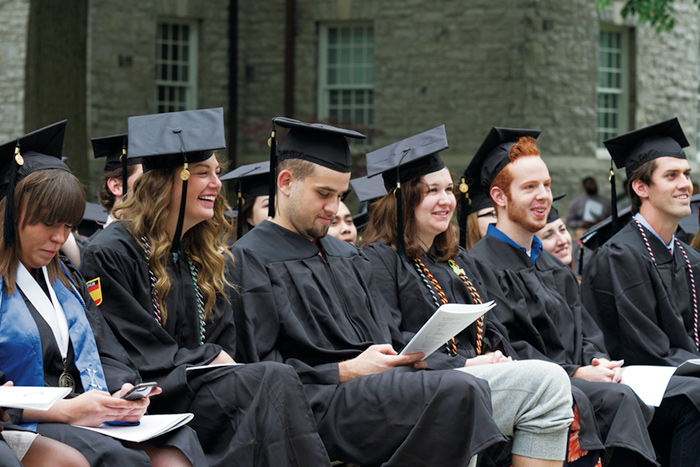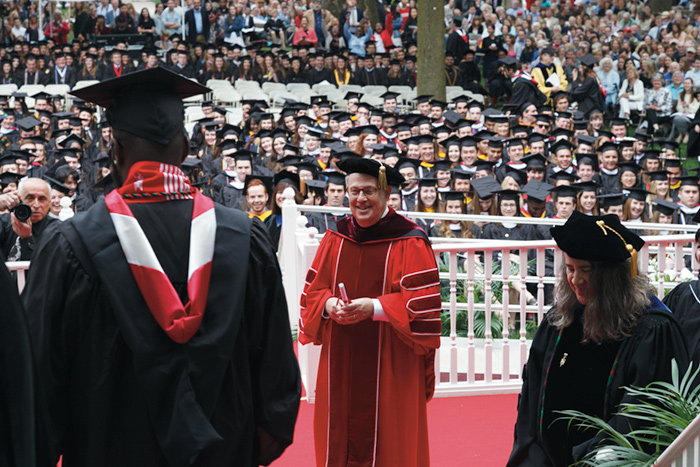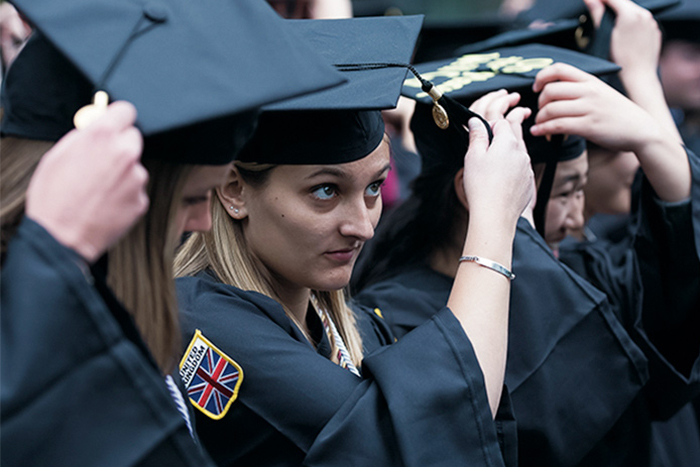Culminating Experiences

Photo by Heather Shelley.
by Katya Hrichak ’17
For college seniors, the path toward completing the requirements for a major may seem long and daunting, with years of classes, projects and exams. At Dickinson, those paths are more varied than at many other institutions, given that the culminating experience for each major is not the same. According to Senior Associate Provost of Academic Affairs Brenda Bretz, the reason for the variation is simple: Dickinson’s approach to academics is different.
“At Dickinson, we really value and honor the discipline itself and whatever makes the most sense for that particular program as determined by our faculty. However they want to deliver that program in this environment, we usually grant them that pathway,” she says. “As more departments have done it and students have really benefited from it, other departments have picked up on that.”
From capstone courses to theses, symposiums to performances, here is a sampling of the different approaches to senior year across campus.
In Writing or in Person
The senior thesis is one of the most talked-about topics leading up to an English major’s final year at Dickinson. From the first year onward, students muse on the required number of words and worry that reaching it is an impossible task. Not all students feel prepared at the beginning of their senior year, but the process of continually workshopping with peers makes the impossible possible.
“It’s independent research, but not lonely,” says David Ball, associate professor of English. “We don’t kick kids off in a boat in the middle of the ocean and say, ‘Good luck writing the senior thesis! Let us know when you’re done!’ ”
So after months of research, revision and peer and professor review, for English majors “done” is turning in roughly 35-50 pages of carefully crafted writing that will pull together their years of preparation and count toward 60 percent of their final grade.
The American studies department also requires seniors to participate in a yearlong process of conducting research and compiling a thesis, but it requires an additional component: In the middle of the spring semester, majors come together to formally present their research at the department’s annual symposium and gain feedback that informs their final theses.
“It is an opportunity for them to put together all the things that they’ve learned in American studies and other departments,” says Jerry Philogene, associate professor of American studies. “It’s a culmination of their time at Dickinson and as American studies majors.”
The music department’s colloquium has been a part of the senior experience for the past 15 years. Students complete an assignment that corresponds with their chosen concentration within the major, often taking the form of a composition, score analysis, essay or performance with program notes.
A formal presentation is not required for seniors in the studio art major, but they participate in the senior exhibition, which showcases the works of all students in the yearlong seminar. Additionally, studio art majors create a catalog that discusses in detail the art present in the exhibition.
“I have really enjoyed the sense of community among the studio art majors and members of the art department,” says Talia Amorosano ’17 of completing the exhibition and catalog. “It has been so rewarding to get to know so many talented people and to go through the ups and downs of the creative process with supportive and helpfully critical people by my side.”
“The senior studio seminar … challenges students to develop an artistic identity,” says Todd Arsenault, associate professor of studio art in the Department of Art & Art History. “The catalog and exhibition help students understand how their work is perceived by a larger audience.”

Photo by Carl Socolow ’77.
Extra, Extra … or Not!
Although it is common for majors to require an extra project of some sort, many seniors participate in a capstone course without an accompanying project. In the economics department, the senior seminar is required, but nothing additional is. According to Associate Professor of Economics Andrew Farrant, with the amount of students enrolled in the major, there are not enough professors to make adding a senior thesis or similar project plausible. But he says this by no means makes this major easier than any other. “[Economics] is highly vertical in terms of prerequisites, so it is near impossible to get to be a senior econ major without already having been through econ boot camp.”
Like economics, the Spanish department requires a senior seminar without formal presentations or lengthy papers. And earth sciences used to require a senior seminar but developed a new model several years ago that allows students to choose a capstone experience that best prepares them for life after graduation. The course offerings of independent research, student/faculty collaborative research or participation in an internship aim to prepare students for graduate school or work in the industry, as well as synthesizing their undergraduate education.
Outside the Box
While presentations and theses are the most common senior capstone approaches, several departments have a different approach that better fits their program. Three years ago, international business & management began engaging seniors in a semesterlong consulting project. The project connects current students to alumni and allows them the chance to consult with companies such as Google, Procter & Gamble, McCormick & Company and Colgate-Palmolive, among others.
International studies takes a different route and requires seniors to complete independent research in the fall and take two examinations, one written and one oral, in the spring. The written exam assesses their knowledge in the four areas of international studies and serves as a prerequisite to the oral exam, during which students sit in front of a panel of professors and answer questions to demonstrate their knowledge.
Although the pre-examination worry for international studies students parallels the pre-thesis worry for English students, Associate Professor of International Studies (and department chair) and Political Studies Kristine Mitchell says it’s a part of the curriculum the faculty highly values.
“Preparing for and completing the exam gives students the chance to pull together all the various parts of their interdisciplinary major—the economics, the history, the political science, the concentration—and think about how these different parts link up with one another,” she says. “It’s really a culminating experience for the students.” This is a sentiment expressed by many other department chairs in relation to their senior experiences.

Katya Hrichak '17 turns her tassel, surrounded by classmates. Photo by Heather Shelley.
No Square Pegs Here
Professors are also in agreement over how fortunate they are to be at an institution where individual departments are allowed to assign these requirements as they see fit. “For the college to have a blanket policy about what the capstone is would be like fitting a square peg in a round hole all the time; sometimes it would work, and sometimes it wouldn’t,” says Helen Takacs, associate professor of international business & management. “I think one of the beauties of Dickinson is the recognition that all areas of knowledge are important, but they’re unique.”
Professor of Music Jennifer Blyth agrees. “It’s totally Dickinson,” she says. “It’s really a sign of respect, I think, to everyone’s individual field, that they know best how students can be pushed, how far they can be pushed and what they would glean from that process. It’s one of the reasons why we’re all still here— because we have a say in how we manage our curriculum.”
The idea for this story came while Katya Hrichak ’17 (English, music) was working on her English thesis as well as her music colloquium. Along with noticing how different her two capstone projects were, she saw her classmates each undergoing very different assignments for their majors. As she started to explore further, the wealth of information got richer and vaster. This story is the culmination of 10 interviews and countless hours of transcribing, list-making and revision. It is a fitting end to her year as our student writer, during which she accrued more than 20 bylines! Congratulations, Katya!
Learn more
Published July 11, 2017